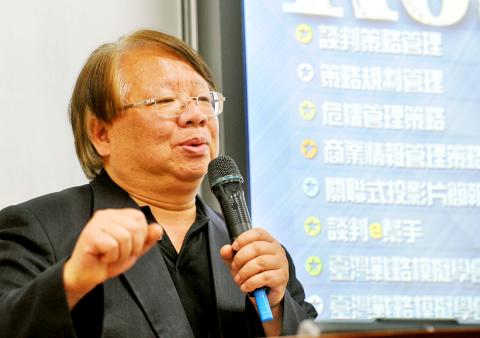Former National Security Council (NSC) deputy secretary-general Chang Jung-feng (張榮豐) yesterday criticized current council head King Pu-tsung’s (金溥聰) visits last month to local intelligence units, calling them the beginning of the collapse of the national security system.
Chang’s criticism follows former council secretary-general Ting Yu-chou’s (丁渝洲) comments a day earlier accusing King of over-reaching his authority and questioning President Ma Ying-jeou’s (馬英九) over-reliance on his confidants.
To understand the gravity of King’s actions requires an understanding of how the presidential decisionmaking process works, Chang said.

Photo: Taipei Times
The council, formally institutionalized on Dec. 30, 1993, is patterned after the US’ National Security Council — a government body that aids the president in policy and decisionmaking, Chang said.
The presidential decisionmaking process consists of four steps: analyzing the problem; coming up with possible solutions; making the decision; and executing and supervising it, he said.
The council’s role involves the first two, which is to aid the president in making decisions on cross-strait, national defense and diplomatic affairs, Chang said, adding that during former president Lee Teng-hui’s (李登輝) term, it was strictly forbidden for the council to intervene in domestic affairs.
The fact that the council is responsible only for problem analysis and offering potential solutions — but not decisionmaking — is the reason it is called an “aiding and counseling” body, Chang said.
Chang said the decisionmaking process is completed by the president holding a national security conference. After reaching a decision, the president would then appoint an official to oversee policy implementation. The person in charge — who might be the NSC secretary-general, the premier, or the Mainland Affairs Council minister — varies in accordance with the nature of the mission.
The NSC would need, for problem-solving, the ministries, other councils and the National Security Bureau (NSB) to provide information about the mission or policy, Chang said, adding that the NSB in turn has six major intelligence units responsible for gathering information.
All information would be processed and appraised by the NSB for the president to make decisions and for the NSC to analyze the problem.
Chang said that if King could “visit” the six major intelligence units whenever he wants to just to show them “who’s the boss,” that would be interference with the functions of the other units.
This could give rise to inter-unit infighting as some attempt to curry favor with the “boss,” which in turn would hamper their ability to fight the nation’s real enemies, he said.
With a weakened intelligence system, the NSC, Ma and King would be on the receiving end of a torrent of information that they, without the requisite skills, would be unable to handle and process, rendering the information useless, he said.

‘ABUSE OF POWER’: Lee Chun-yi allegedly used a Control Yuan vehicle to transport his dog to a pet grooming salon and take his wife to restaurants, media reports said Control Yuan Secretary-General Lee Chun-yi (李俊俋) resigned on Sunday night, admitting that he had misused a government vehicle, as reported by the media. Control Yuan Vice President Lee Hung-chun (李鴻鈞) yesterday apologized to the public over the issue. The watchdog body would follow up on similar accusations made by the Chinese Nationalist Party (KMT) and would investigate the alleged misuse of government vehicles by three other Control Yuan members: Su Li-chiung (蘇麗瓊), Lin Yu-jung (林郁容) and Wang Jung-chang (王榮璋), Lee Hung-chun said. Lee Chun-yi in a statement apologized for using a Control Yuan vehicle to transport his dog to a

Taiwan yesterday denied Chinese allegations that its military was behind a cyberattack on a technology company in Guangzhou, after city authorities issued warrants for 20 suspects. The Guangzhou Municipal Public Security Bureau earlier yesterday issued warrants for 20 people it identified as members of the Information, Communications and Electronic Force Command (ICEFCOM). The bureau alleged they were behind a May 20 cyberattack targeting the backend system of a self-service facility at the company. “ICEFCOM, under Taiwan’s ruling Democratic Progressive Party, directed the illegal attack,” the warrant says. The bureau placed a bounty of 10,000 yuan (US$1,392) on each of the 20 people named in

The High Court yesterday found a New Taipei City woman guilty of charges related to helping Beijing secure surrender agreements from military service members. Lee Huei-hsin (李慧馨) was sentenced to six years and eight months in prison for breaching the National Security Act (國家安全法), making illegal compacts with government employees and bribery, the court said. The verdict is final. Lee, the manager of a temple in the city’s Lujhou District (蘆洲), was accused of arranging for eight service members to make surrender pledges to the Chinese People’s Liberation Army in exchange for money, the court said. The pledges, which required them to provide identification

INDO-PACIFIC REGION: Royal Navy ships exercise the right of freedom of navigation, including in the Taiwan Strait and South China Sea, the UK’s Tony Radakin told a summit Freedom of navigation in the Indo-Pacific region is as important as it is in the English Channel, British Chief of the Defence Staff Admiral Tony Radakin said at a summit in Singapore on Saturday. The remark came as the British Royal Navy’s flagship aircraft carrier, the HMS Prince of Wales, is on an eight-month deployment to the Indo-Pacific region as head of an international carrier strike group. “Upholding the UN Convention on the Law of the Sea, and with it, the principles of the freedom of navigation, in this part of the world matters to us just as it matters in the